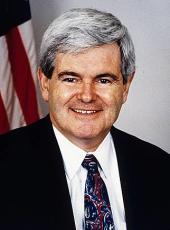
Gingrich Campaign Press Release - Newt in Quad City Times: Optional Flat Tax Will Launch Recovery
Originally published in the Quad City Times
By Newt Gingrich
The coming economic boom will begin the minute the television networks announce the defeat of President Obama's reelection bid on Election Day 2012.
Every single American worker, entrepreneur, and small business owner will finally know that their taxes will not be increased, their regulatory burdens will not be increased, and that government will no longer pick winners and losers in what is the already challenging task of competing in a global economy. The resulting explosion of economic and entrepreneurial activity will be enormous as confidence soars that the federal government will no longer be an active opponent of their success.
But it will not be enough to generate an enduring recovery.
As a candidate for President, I have outlined a set of proposals in a new "21st Century Contract with America" that will fuel the next investment and jobs boom, reform entitlements, and control spending, which will set us upon the path to balance the federal budget within the next ten years.
The key to a robust recovery in job creation is to simplify the tax code and maximize capital investment, which begins with eliminating the capital gains tax and the death tax, reducing the corporate tax to 12.5 percent, and 100 percent expensing of all new capital equipment purchases.
These tax changes will liberate private capital to move quickly to the most productive investments, thereby accelerating economic growth. This is the opposite of the failed model practiced by the Obama administration, which is bureaucracies steering taxpayer stimulus dollars to allegedly "shovel ready" jobs and politically connected firms such as Solyndra.
At the same time as we liberate capital to create new jobs, we must liberate taxpayers from the IRS tax code, which is why my jobs proposals also call for an optional flat tax of 15 or less%. All workers and businesses would have the freedom to choose each year to file their income taxes either under the new flat tax option with limited deductions or under the current U.S. income tax code. Anyone who strongly favors a deduction or credit under the federal government's current complex income tax system would have the choice to keep filing that way.
This optional flat tax system will create a new personal deduction for every adult of $10,000 to $12,000 (double for married couple), which would be above the established poverty level at $40,000 to $48,000. The current $1,000 tax credit for each child age sixteen or younger would also apply, as would the current earned income tax credit (EITC).
An optional flat tax reform will be simple: tax returns can be done on one sheet of paper. Subtract from income a standard deduction and deductions for charity and home ownership, multiply the result by the fixed single rate of taxation of at most 15%, and the process is over.
The optional flat tax could save taxpayers an estimated $400 billion each year in costs of record keeping, paying for tax advice, and filling out complicated tax returns. This savings doesn't even account for countless hours of aggravation and worry and the sheer complexity of tax compliance. These tax compliance savings are the functional equivalent of a permanent, pro-growth tax cut and will provide a substantial boost to annual growth rate.
This concept of an optional flat tax would give American taxpayers an opportunity to choose simplicity versus complexity and a single rate over a lot of deductions.
Because the flat tax is optional, it does not raise taxes on a single person or unfairly impact seniors, lower income workers, or the poor.
Once we combine these pro growth tax reforms with my other reform proposals for welfare reform, social security, and spending, we will experience a stunning and swift turnaround in the economy.
How can I be so confident? Because we've done it before, and quite recently. During the four years I served as Speaker of the House, we controlled spending to the lowest level since the 1950s (2.9 percent a year) and enacted a set of bipartisan reforms, including tax cuts and welfare reform, that created the national conditions for the creation of 11 million new jobs, four balanced budgets in a row, a decline in the unemployment rate to 4 percent, and a $400 billion reduction in the national debt.
The result of a record number of Americans working resulted in a dramatic turnaround in the fiscal and debt outlook of the United States. When I arrived as Speaker, the CBO was projecting that over the next decade the cumulative federal budget deficits would total $2.7 trillion. Shortly after I left office in January 1999, CBO projected that over the next decade that federal surpluses would total over $2.3 trillion– a four-year turnaround in the financial outlook of the United States of $5 trillion.
The turnaround in the projected national debt was even more stunning. In January 1995, CBO's ten-year outlook of the federal debt as a percentage of GDP was 56.1 percent. When I left the Speakership in January 1999, CBO's projected federal debt as a percentage of GDP to be 8.9 percent in 2009.
The reform proposals of the 21st Century Contract with America will lead to another era of booming economic growth and new, higher-paying jobs. In particular, the tax reform incentives of the optional flat tax plus the huge amounts of new capital here at home produced by the elimination of the capital gains tax will cause capital investment to flow into the American economy from around the world. This economic vision will create a future of enduring prosperity for all American workers.
Newt Gingrich, Gingrich Campaign Press Release - Newt in Quad City Times: Optional Flat Tax Will Launch Recovery Online by Gerhard Peters and John T. Woolley, The American Presidency Project https://www.presidency.ucsb.edu/node/298198
